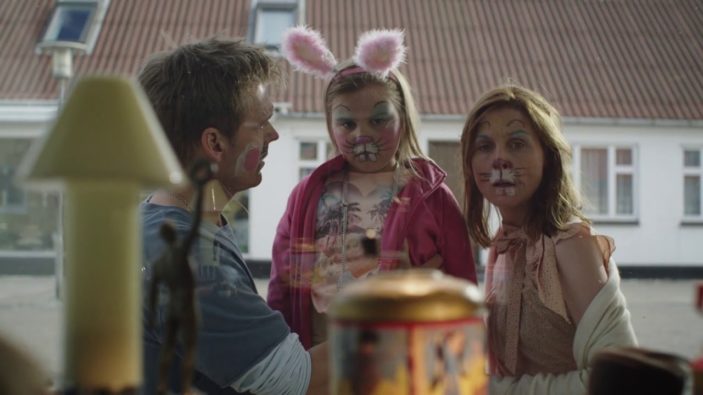
Koko-di Koko-da starts off in an oddly jovial fashion. We are taken into a forest and there is a small troupe of people – visually influenced by nursery rhymes – dancing in unison while singing merrily. Yet not all is as it seems; and it sets the tone for what is to come: an eerie and downbeat ride that explores different wavelengths that teeters towards madness.
The story follows a loving couple Tobias and Elin (both played with compelling nuance by Leif Edlund and Ylva Gallon) stricken by a tragic event that tears them apart; leaving them on the verge of divorce. Three years later, they begin to mend their relationship and pick up the pieces by going on a camping trip. But the trip takes a dark turn as they encounter that same troupe of people featured at the beginning. A nightmarish, never-ending fall into madness ensues.
It is quite hard to classify Koko-di Koko-da in terms of genre. It displays elements of a psychological thriller when it explores the mindsets of the characters going through stages of grief. There are elements of exploitation, when it features moments of violence in backwoods settings; elements of dark humour as the lead characters go through stages of humiliation that coincide with the fairy tale aesthetic and elements of surrealism/stageplay when it explores different ways of storytelling via shadow plays and mood pieces. But does it all come together to create a cohesive and compelling piece of work?
The first act of the film starts off very well, as writer/director Johannes Nyholm establishes the characters (the laidback and uninitiated behaviour of Tobias and the concerned and attentive Elin), the stakes and the mythology (involving the music box and shadow plays) succinctly and with sharp verve. The tragic event (which will not be spoiled) that triggers the story into action is filmed with such remarkable restraint that it comes across as a shock but it never feels shoehorned in for the sake of shedding tears.
The storytelling itself follows a familiar structure. One that brought to mind examples like Groundhog Day, Edge of Tomorrow, the Happy Death Day films and others. While the latter two films utilize the structure thanks to a science-fiction/fantasy backdrop, Koko-di Koko-da takes the metaphoric route as it explores the mindset of the characters as their actions (or inactions) to achieve a sense of normality breed stark consequences, leading them into a torturous limbo.
And while witnessing said limbo may sound like a torturous experience for the audience, it does yield strong rewards. In one major sequence, Elin escapes his predicament from the troupe and the film shifts into a singular take where she realizes an epiphany about the subject of the tragedy. And it is that pivotal moment where all the repetition and escalation of emotion come together in a serene manner that signals Koko-di Koko-da taking flight; especially in how it illuminates how humanity deals with grief and live in the same state of mental abuse over and over until they open themselves up.
While Nyholm succeeds in capturing the moods and commenting on the human condition, he struggles in terms of characterization and nuanced storytelling. The characters of Tobias and Ellin are thinly developed and feel like plot devices to get the message going rather than people for the audience to engage with.
The storytelling devices – especially the shadow plays involving rabbits – tends to hammer the message and plot points, which makes the destination less rewarding and gets the audience one step ahead of the film. Speaking of the destination, the ending itself can be quite disappointing due to how abrupt it is. While the ending fits the narrative in a thematic sense, a little more catharsis in terms of the development of character arcs would have made it perfect.
Overall, Koko-di Koko-da is a loopy, unsettling and sorrowful trek into madness that proves to be effective as a metaphor of grief as it references horror tropes from the exploitative to the surreal very well. It may be tough going for audiences but it rewards patient viewers with its thematic punch in its storytelling. Recommended.
![]()
![]()
![]()
![]()
![]()
THREE AND A HALF STARS (OUT OF FIVE)
Koko-di Koko-da will be available on demand from December 8th.
